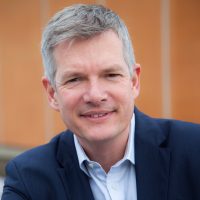Capability, Reciprocity, and Luck

Tim Stuchtey
Brandenburg Institute for Society and Security; German University of Digital Science
Dr. Tim H. Stuchtey is a Geoeconomics Non-Resident Senior Fellow at AGI. He is the executive director of the Brandenburgisches Institut für Gesellschaft und Sicherheit (BIGS), a homeland security think-tank based in Potsdam, Germany. He is also Professor for Economics of Cybersecurity at the German University of Digital Science in Potsdam. He has served as Director of AGI's Business & Economics Program. He works on various issues concerning economic policy, the economy of security, the classic German ‘Ordnungspolitik,’ and the economics of higher education.
Dr. Stuchtey studied economics with a major in international trade and international management and graduated in 1995 from the Westfälische Wilhelms-Universität in Münster. In 2001 he earned a Ph.D. from the Technische Universität Berlin in economics, which he obtained for his work in public finance and higher education policy. He worked as an economist for the German Employers Association and as a university administrator both at Technische and Humboldt-Universität Berlin. He was also the managing director for the Humboldt Institution on Transatlantic Issues, a Berlin-based think tank affiliated with Humboldt-Universität.
He has published a number of articles, working papers, and books on the security industry, homeland and cybersecurity issues, higher education governance and finance and on other questions of the so-called ‘Ordnungspolitik.’
With a mixture of capability, reciprocity, and pure luck, Germany has so far avoided a Jihadi terrorist attack (with the exception of a “lone wolf” killing of two American soldiers at the Frankfurt airport in 2011). The capability of Germany’s security apparatus seems to be more effective than many realize. Unlike in some European partner countries, Germany has consistently shied away from certain restrictive measures to gather, store, and use information interfering with its citizens’ privacy. The reciprocal exchange of information among the Western intelligence community has clearly helped the German police and intelligence agencies a great deal to use their capability and to learn about plans and intentions early enough to avoid a successful attack. However, in some cases, Germany was apparently just lucky that undetected plans of would-be terrorists failed due to a lack of capability on their side, stupidity, or simply as the result of a stochastic process. So far, so good.
Currently, German society is divided over the refugee crisis. Even among the intellectual and business elite, the issue is divisive unlike any seen for a long time. You are either a naïve do-gooder or a right-winger; there seems to be no middle ground in the debate. In Saxony and elsewhere, hate protests against newly arriving refugees are becoming violent while at the same time the so-called anti-fascist movement uses the refugee crisis as a pretense for attacks against its usual targets. The silent majority stands at the sideline, confused, insecure about the future, and looking for guidance. Guidance they hope for from German chancellor and Time’s Person of the Year 2015, Angela Merkel. However, she is in the spotlight of the criticism, and not only from the political extreme spectrum but also from fellow European leaders who blame a good share of the influx of refugees on her open door policy in the summer of 2015.
Germany was preparing itself to cope with a dramatic shrinkage of its population but, due to the migration of around one million refugees in 2015, the population in Germany grew by roughly 1 percent. There is a good chance that this growth will continue at least into 2016, probably beyond (although potentially at a slower pace). One does not need to be a radical to have the impression that an influx of this magnitude from predominantly Muslim societies will neither be cost free, nor will it mean that nothing will change in Germany. Instead, it is becoming apparent that not only will the migrants have to adapt, but Germans will also have to cope with the changes brought about by the number of new inhabitants from quite different cultures. Yet, as I have argued before, “change” does not have a positive connotation in German politics.
With all the fuzziness and the current state of angst in large parts of German society, a failure to stop any attack, but in particular an attack with an Islamist bent, could have a dramatic effect on the liberal—but somewhat unstable—social equilibrium at the moment. The positive attitude of the majority of Germans could shift toward a more restrictive and even more isolationist approach. The wishful thinking that Germany could become a large Switzerland in a world in turmoil would be dominant. The consequences for European integration at a time when the possibility of a Brexit looms would be disastrous. One can only imagine how Putin and his trolls would try to use such a situation to fill the power vacuum that a Germany in imbalance with itself would create.
Thus it is in the German, as well as in the U.S., interest to do everything legally and proportionally possible to avoid such an outcome. Despite the comprehensible mainstream criticism about—and in some cases, of—the cooperation among the intelligence institutions, it is more cooperation between the U.S. and Germany in this field that is needed. While the former certainly has better sources in Northern Africa, Iraq, or Afghanistan, the latter should have better access to those who are successful at reaching Europe. Both actors are needed to provide sound security. Let us hope that the capabilities of the German security institutions and Western cooperation in intelligence will continue to avoid any significant attack in Germany. If not, we can only hope to stay lucky.
Dr. Tim H. Stuchtey is the managing director of the Brandenburgisches Institut für Gesellschaft und Sicherheit (BIGS), a homeland security think-tank based in Potsdam, Germany. He is also a Nonresident Fellow at AGI.








